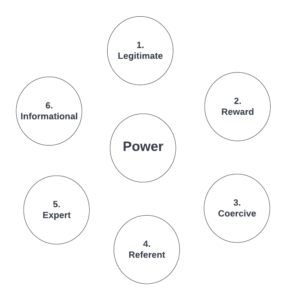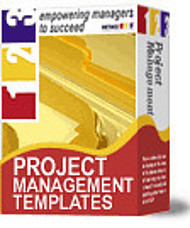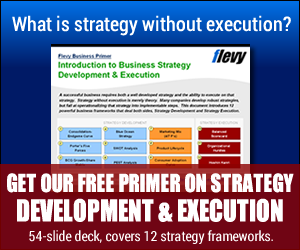There are two types of power that professionals can have: positional and personal. French and Raven have outlined 6 sources of power that can provide you with positional power, personal power, or a combination.
This post examines those sources of power and how to tap into them to enhance your effectiveness as a strategic project manager.
French and Raven’s 6 Sources of Power
 In 1959, two social psychologists, John French and Bertram Raven, originally identified 5 sources of power. They added a sixth one, Informational Power, in 1965.
In 1959, two social psychologists, John French and Bertram Raven, originally identified 5 sources of power. They added a sixth one, Informational Power, in 1965.
Here are French and Raven’s 6 sources of power:
- Legitimate Power – Responsibility and authority is tied to position, with the expectation that demands can be made and should be complied with.
- Reward Power – The source of power is money, free time, praise, and related things.
- Coercive Power – This is the power to punish – whether executed or potential – for non-compliance. This tends to be most effective when not to be used often.
- Referent Power – This power source derives from likability, charisma and other factors that can earn the respect of others.
- Expert Power – Expert power is derived from a person’s skill and knowledge base, such as technical, legal, medical, etc.
- Informational Power – The source is persuasion by evidence, where information is ‘controlled’. It tends to be more widely believed that in the long run, information withheld reduces power, and transparency wins.
These six powers fit into two types of power:
- Positional Power – The first three sources of power in the list are based on position.
- Personal Power – The last three sources of power on the list are based on personal attributes, qualities, or experiences.
Let’s look at how the 6 sources of power map to positional and personal power.
Positional Power
Most positional power results from the first three power sources on the list, but informational power is also partly positional.
Here’s how power relates to position:
- Legitimate Power – A person in a particular role, such as president, director, team leader, or project manager has ‘legitimate power’ based on position. That power is lost when they move out of that role – but of course they can retain substantial power via some other power sources.
- Reward Power – This derives from the expectation of rewards on the part of subordinates for complying with requests or directives. This power is based on the person’s ability to control those rewards. For example, in a small business, the leader may have total control over rewards, as long as the business is doing well. In a larger organization, control of rewards may be widely distributed and influenced by others, reducing the power of the positional leader. Of course, the ability to give praise and thanks is free to all!
- Coercive Power – This power is least desirable, as forcing people to comply often stimulates resistance. If the long run, coercive power works only if used judiciously, as a way of adding discipline that will help in the long run.
- Informational Power – Frequently people are in a position to have visibility into information that others do not. That visibility is a source of power. Sometimes information needs to be protected, and those that know it gain some degree of power.
Positional power is a form of pushing, as opposed to pulling, to get what you want.
Let’s turn to how power can also be obtained from personal means.
Personal Power
Personal power is different from positional power in that it is associated specifically with the person. It provides a special opportunity because to a large extent, especially for Expert Power, it can be earned and controlled.
- Referent Power – This power source derives from purely personal factors. It can be associated with positional attributes (ie. being an actor or politician). In order for it to be positive, whether personal or positional, the person needs to use it with integrity and honesty.
- Expert Power – Expert power also comes with a responsibility – to practice honesty and integrity. People look to experts for guidance and decisions.
- Informational Power – I also included this power source under personal power because when it is freely shared, it empowers others. In the process it can earn goodwill and respect, which translates to personal power.
Personal Power provides the opportunity to lead by pulling instead of pushing. Personal power enables a person to lead even without authority.
Impact of Power on Strategy
One place where the power paradigm impacts strategy is in organizational structure.
At one end of the spectrum, an organization can be highly structured, and power is formalized. Larger organizations tend to need more structure. Organizations can also be shaped by the types of critical activities they perform, including how complex they are. The more organizational hierarchy that exists, the more positional power will exist within the organization.
—————————————-
I recommend these strategy resources (paid link):
—————————————-
The trend for some time has been toward less formalized, flatter organizational structures. That means that personal power is being leveraged more over positional power. Individuals have greater control over the influence they can have via the effective use of expertise and informational power.
The rapid pace of change has made it more critical to manage the change process. This requires the judicious choices between positional and personal power by strategists in organizational design decisions.
Impact of Power on Managing Projects
Power sources come into play on projects in many ways.
- Organizational change management – Understanding the power in specific individuals and within the organization is critical. It can provide a reference to inform the ‘to be’ structure needed for the organization to effectively absorb the changes the project brings.
- Leadership without authority – Project managers often find themselves in a matrix structure, with no direct reports but with a strong need to influence. Leveraging the personal power sources – Referent, Expert, and Informational powers – can go a long way to leading effectively even without positional authority.
- Stakeholder management – In managing stakeholder throughout the project, it is very helpful to understand who among your stakeholders have positional authority and who have personal authority. Communication to those individuals needs to be informed in large part by where they derive their power.
- Share information where possible – Unless there is a major security or confidentiality need, err on the side of sharing information. It will lead to greater trust, accountability, and personal power as part of the culture.
—————————————-
I recommend these PM templates (paid link):

—————————————-
Understanding sources of power can be very beneficial to you as a project manager. To that end, it can help to:
- Think about your experiences in terms of power sources.
- Where have you have positional power? How did you leverage it, and how effective were you?
- Where have you exercised personal power? Did you have success? Where did you fall short, and what could you do to improve?
Think about your relationships with those above, below, and across from you in the organization. With a greater understanding of power sources, what new insights can you gain to inform your approach going forward?
Conclusion and Further Resources
Over a hundred years ago, the great leader Winston Churchill said,
“With great power comes great responsibility.”
Where do you see yourself on the list of powers – and how responsible were you with your powers?
Alex Lyon, PhD, Communication Coach, provides an excellent video on the six powers:

Hey there! 🌟 Just finished reading your article on French and Raven’s 6 sources of power, and I have to say, it’s like you’ve cracked the code to navigating the intricate world of project management! 🚀 Your breakdown of the different power bases and how they play into leadership dynamics was not just insightful but also incredibly practical.
I especially loved how you brought in real-world examples to illustrate each source of power. It made the whole concept so much more tangible and relatable. The way you explained the nuances between legitimate power and expert power really hit home for me – it’s like you’ve been a fly on the wall in my office meetings! 😅 Your writing style is engaging, and you manage to make what could be a dry topic genuinely interesting.
Thanks for sharing your expertise! Looking forward to more gems like this. Keep up the fantastic work! 💪🏽
Thank you – glad you got some value here!